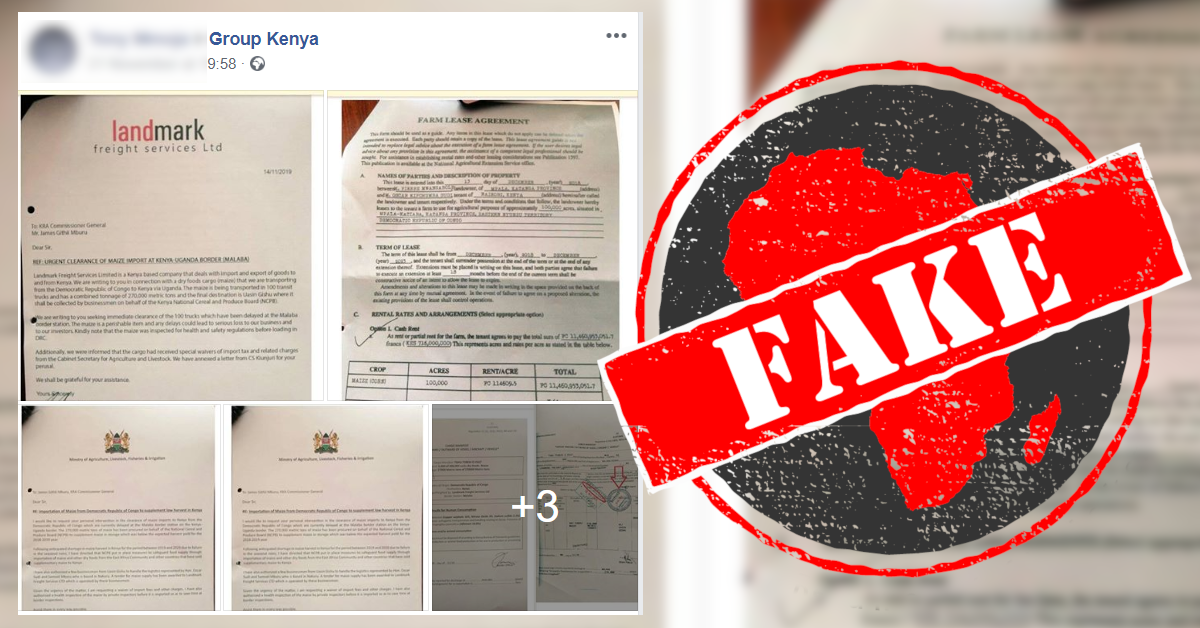Three documents shared on Facebook in November 2019 claim Kenya is planning to import maize from the Democratic Republic of Congo because of a poor local harvest.
The first is a letter addressed to James Githii Mburu, head of the Kenya Revenue Authority, the country’s tax and tariffs agency. It’s supposedly signed by agriculture minister Mwangi Kiunjuri.
The subject line reads: “Importation of Maize from Democratic Republic of Congo (DRC) to supplement low harvest in Kenya.”
The letter asks for Mburu’s “personal intervention in the clearance of maize imports to Kenya from the DRC which are currently delayed at the Malaba border station on the Kenya Uganda border”.
It claims “270,000 metric tons of maize” had been bought by the National Cereal and Produce Board to supplement stored maize, because of an anticipated low harvest due to poor rainfall.
The second document shared on Facebook is a farm lease agreement, while the third is addressed to Landmark freight services Ltd, authorising the urgent clearance of the maize at the Malaba border post.

On 21 November agriculture minister Kiunjuri shared the set of documents on his Twitter page with “FAKE” stamped on all of them in red.
Unlike other letters of the ministry, the letterhead on this fake one didn’t indicate the specific office from which it had come from, and neither did it indicate the ministry’s address.
Oscar Sudi, member of parliament for the Kapseret constituency, also gave his reaction. Kapseret is in Uasin Gishu county, which is considered the breadbasket of Kenya.
Sudi posted the documents – again stamped “FAKE” – on his Facebook page. “Ignore such FAKE documents spread by malicious haters,” he wrote. – Grace Gichuhi
The first is a letter addressed to James Githii Mburu, head of the Kenya Revenue Authority, the country’s tax and tariffs agency. It’s supposedly signed by agriculture minister Mwangi Kiunjuri.
The subject line reads: “Importation of Maize from Democratic Republic of Congo (DRC) to supplement low harvest in Kenya.”
The letter asks for Mburu’s “personal intervention in the clearance of maize imports to Kenya from the DRC which are currently delayed at the Malaba border station on the Kenya Uganda border”.
It claims “270,000 metric tons of maize” had been bought by the National Cereal and Produce Board to supplement stored maize, because of an anticipated low harvest due to poor rainfall.
The second document shared on Facebook is a farm lease agreement, while the third is addressed to Landmark freight services Ltd, authorising the urgent clearance of the maize at the Malaba border post.

‘Ignore fake documents spread by haters’
On 21 November agriculture minister Kiunjuri shared the set of documents on his Twitter page with “FAKE” stamped on all of them in red.
Unlike other letters of the ministry, the letterhead on this fake one didn’t indicate the specific office from which it had come from, and neither did it indicate the ministry’s address.
Oscar Sudi, member of parliament for the Kapseret constituency, also gave his reaction. Kapseret is in Uasin Gishu county, which is considered the breadbasket of Kenya.
Sudi posted the documents – again stamped “FAKE” – on his Facebook page. “Ignore such FAKE documents spread by malicious haters,” he wrote. – Grace Gichuhi
Republish our content for free
For publishers: what to do if your post is rated false
A fact-checker has rated your Facebook or Instagram post as “false”, “altered”, “partly false” or “missing context”. This could have serious consequences. What do you do?
Click on our guide for the steps you should follow.
Publishers guideAfrica Check teams up with Facebook
Africa Check is a partner in Meta's third-party fact-checking programme to help stop the spread of false information on social media.
The content we rate as “false” will be downgraded on Facebook and Instagram. This means fewer people will see it.
You can also help identify false information on Facebook. This guide explains how.


Add new comment